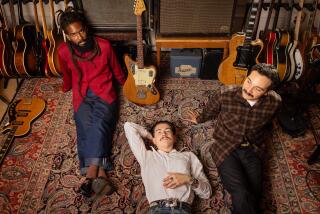Jamaican Duo Mixes Reggae With Pop Textures, Dance Beats
- Share via
The Wailing Souls had come to Los Angeles four years ago for the sake of their own creativity, they say now. At an Encino recording studio, the Jamaican-born duo found that their reggae music was encouraged to flow in more contemporary directions.
“The music really was not improving in Jamaica,” says singer Winston (Pipe) Matthews. “It stopped. We knew that reggae was not just basic hard-core reggae, because it can take in different trends and variations. Everything changes and grows.
“We always did these kind of songs. But in Jamaica, producers didn’t want to hear that. They just wanted to hear hard-core roots.”
It’s a genre Matthews argues has changed little since the death of reggae innovator Bob Marley in 1981. For their own more recent experiments, Matthews and Lloyd (Bread) MacDonald have mixed traditional reggae rhythms with a variety of pop textures and dance beats, resulting in the recently released “All Over the World” album on Columbia Records.
Their new style, they say, is partly designed to help broaden the popularity of the music they’ve spent their lives playing. Elements of soul, rap and rock are among the album’s ingredients, along with smooth new reggae versions of the Rolling Stones’ ‘70s-era rock ballad “Sweet Black Angel” and the folk duo Kate and Anna McGarrigle’s “Heartbeats Accelerating.”
“Look at a group like UB40,” says Matthews. “Those guys do mostly Jamaican music, and they sell millions. It’s very hard for hard-core reggae to come out of Jamaica and sell a million. Bob Marley didn’t do that.
“We found out that to get the vast majority that we want to accept the music, we have to blend the music with something extra,” he adds. “People like to hear new ideas. The more creativity the better.”
Still, the Wailing Souls say they haven’t abandoned the roots of reggae. Scattered among the new album’s more contemporary tracks are such songs as “Shark Attack” that stay within reggae’s traditional boundaries. “The roots are always there,” explains MacDonald. “We’re just trying to make things interesting.”
Both singers are relaxing in the Santa Monica offices of Columbia, both of them in beards and matching tall purple caps. They speak in warm, richly accented tones, talking contentedly of their good fortune since signing to a major record label.
The two had grown up together in the blighted Trenchtown district of Kingston. “We have always been good brethren, even before we were partners,” says MacDonald. “There were like four of us that were always together, at birthday parties, anywhere.” They began recording as teen-agers in 1967, ultimately providing backing vocals for such reggae luminaries as Marley, Joe Higgs, Jimmy Cliff, Peter Tosh and others.
Matthews compares the “oppressed community” of their shared hometown to “hell’s door. You’re at hell’s door.
“Everything happens there: murder, rape, and at the other side, sweet music, great sportsmen, great scholars,” adds MacDonald. “It’s like a great melting pot. If you step over this line, you end up in prison, or if you go this way, you’ll be a musician.
“It’s the best of everything in Trenchtown: the best thief, the best gunman, the best singer, the best cricketer, the best football player.”
Against this background, the Wailing Souls have spent a career, and an earlier 13 independently released albums, singing songs with social and spiritual messages. “Peace, love and happiness,” insists Matthews. “That is it, you know. Everybody is now going: Peace! Peace! But you cannot have peace without love. If I love you and you love me, then we must have peace. Peace is the second stage.”
The new album was also the first time the Wailing Souls could take their time in constructing the music. Earlier records had often been completed in less than a week, with hardly a moment for second-guessing or revision.
“Most of the time we did this to survive,” Matthews says. “We have family and have to eat. We didn’t even have a car. Sometimes we wouldn’t know when a song came out after we had made it in Jamaica. Somebody would have to call us and say they saw it in a record shop. We’d ask: ‘Oh, what is the title?’ ”
MacDonald laughs. “In the studio in Jamaica, you can’t fool around,” he says. “Everything is time and money. You don’t have the luxury of doing a demo, going home to listen to it and coming back tomorrow. No. You go in there one time, and that’s it.”
Like most independent reggae albums, the Wailing Souls releases were impossible to find in mainstream record shops, and that was also frustrating. Concert tours were booked by the band itself, without agents or promotional support. And radio relegated their music to special reggae time slots.
“You can’t turn on a commercial radio station and hear reggae,” MacDonald says. “That’s one of those things we’re striving to make right.” Adds Matthews: “What we want them to do is schedule it in regular prime time, just like any other song.”
The Wailing Souls say they hope “All Over the World,” their first major label release, helps them break out of this sort of underground “rebel business,” as they call it. With a concert tour coming up that features a new band of local and Jamaican-born players, the Wailing Souls see this next stage in their career as particularly welcome.
More to Read
The biggest entertainment stories
Get our big stories about Hollywood, film, television, music, arts, culture and more right in your inbox as soon as they publish.
You may occasionally receive promotional content from the Los Angeles Times.











